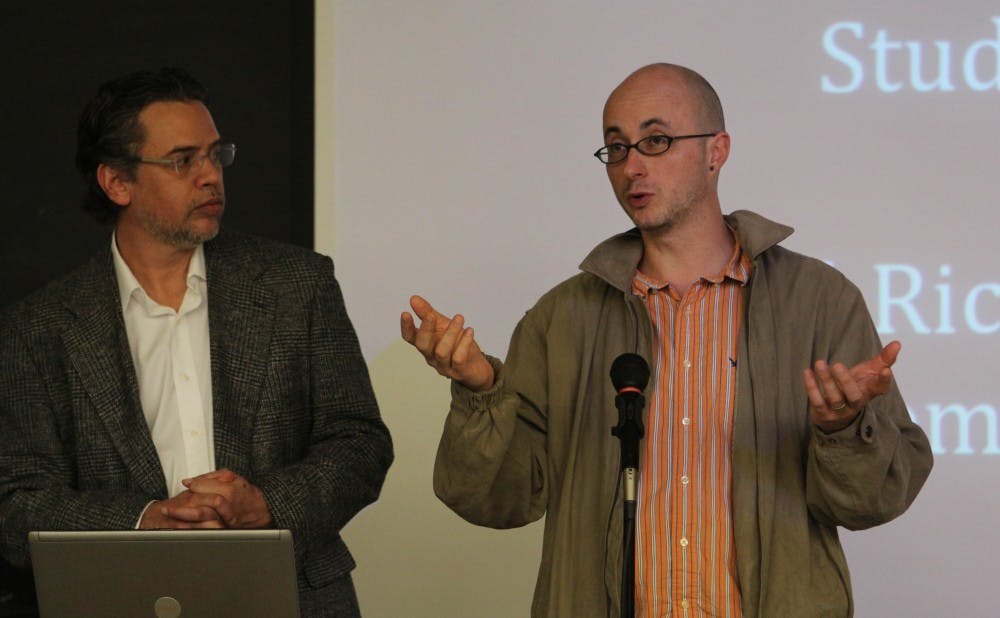Even as online courses move forward at Duke, some faculty members still have misgivings.
At the Arts and Sciences Council's last meeting of 2013, Chair Thomas Robisheaux, Fred W. Schaffer professor of history, opened up the floor to members to express their views on the University’s venture into online education. Discussions on the topic gained momentum last Spring when Duke broke off a contract with a for-credit online course company as a result of a faculty vote. Though some professors—including those already teaching online classes—see the benefits, others feel pressured to incorporate online elements. Faculty concurred, however, on the idea that online education needed to be better defined.
“We need to know what we’re talking about—what these things look like and how they are framed in order to have these kinds of discussions,” said Cary Moskovitz, director of writing in the disciplines for the Thompson Writing Program.
There is pressure for departments to respond to new initiatives, rather than keeping with “yellow edged lecture notes," said Wahneema Lubiano, associate professor of African and African American studies and literature. She added that discussion should not be limited to how departments plan to use technology, but it should also broaden to evaluating technology’s benefits and costs to undergraduate education.
She noted that the University was making more resources available to departments that were showing initiative in online education, while other departments experienced budget cuts.
“We are being addressed as though this is a decision that is going forward and we should show up and figure out where we fit in,” Lubiano said.
Lubiano added that in response to her and her colleagues’ previous opposition to online education, they had faced a disrespectful response from administrators involved with promoting online education in the University.
When Robisheaux asked what should be the next steps in discussing online education, sociology professor Linda George noted that many faculty members would appreciate the opportunity to express their views about online teaching without the constraint of having to address what their specific departments plan to do.
“We need to have a discussion about the underlying issues of what these modes can do,” George said.
A survey of faculty at the Sanford School of Public Policy revealed that many faculty have a fear of integrating technology because they do not know enough about how to use the technology, said Ken Rogerson, director of undergraduate studies for public policy.
Rogerson noted that the survey showed that most Sanford faculty believed that seminars should never include significant technological components.
Major concerns in the biology department—which recently began discussions of online education—include not wanting to dilute student-faculty interactions, student-student interactions or the “Duke brand,” said Chantal Reid, assistant professor of the practice of biology.
Robisheaux spoke about the various formats of online education. He noted that few classes would ever be purely online courses.
“I have learned to let go of the stereotypes,” Robisheaux said, regarding the different formats.
He noted that there are currently no purely online courses being offered or slated to be offered during the semester, though several online-only summer courses have been approved for study abroad and DukeEngage participants.
Robisheaux said any courses offered during the semester would be “blended,” including both online components as well as face-to-face interactions. He explained how using technology could range from using Sakai to a flipped classroom model, which allows for different types of activities in the classroom.
Various faculty members also commented on the potential value of integrating technology into their departments.
“Our department is quite comfortable with technology,” said Charles Becker, associate chair of economics and director of pre-Ph.D. advising and Ph.D. placement. “But we need to remember that the departments of the University are not homogenous and the stresses vary a great deal.”
Becker said taking advantage of the ability to experiment with online course formats was important this year. He said he is a firm believer in trial-by-error experimentation and noted that some ventures will inevitably be unsuccessful.
Carol Apollonio, professor of the practice in Slavic and Eurasian Studies, said it is clear that all departments are using technology in innovative ways. She said it makes more sense to focus the conversation on the important issue of how credit will work for courses with significant online components.
In other news
Richard Rosa, chair of romance studies and associate professor of Spanish and Latin American studies, proposed a new major program in Brazilian and Global Portuguese Studies.
“This new major will not only complete the romance studies department but also compliment a whole area of the world that is represented by this language,” Rosa said.
In response to faculty questions regarding student interest, Rosa and Lee Baker, dean of academic affairs of Trinity College, noted that there are increasing rates of students interested in study abroad in Brazil, as well as in Portuguese language.
Dean of Arts and Sciences Laurie Patton gave an update on the state of her office for the council, discussing budget, goals and upcoming discussions on advising.
Get The Chronicle straight to your inbox
Signup for our weekly newsletter. Cancel at any time.

